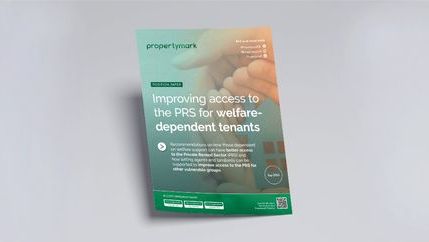
A new system of rent regulation was introduced by the Private Tenancies Act (Northern Ireland) 2022. Section 7 of the Act amends the Private Tenancies (Northern Ireland) Order 2006, by restricting the frequency of rent increases to once every 12 months, but regulation must be made for this new measure to begin.
The Department of Communities, therefore, commissioned the Chartered Institute of Housing (CIH) to carry out research to support the Department's responsibilities under Section 7. However, the report finds a failure to provide any evidence that further rent control is required in Northern Ireland.
Being able to afford rent
Tenants have said it is ‘neither easy nor difficult’ to be able to afford their rent and the most up-to-date data on market rents quoted in the report shows affordability is improving.
However, the analysis shows affordability issues are around low-income households driven by punitive aspects of the social security system, such as freezes in local housing allowance (LHA) rates. A simpler and accurately targeted way to improve housing affordability is topping up LHA claimants with a shortfall to the real 30th percentile rent through discretionary housing payments (DHPs) or welfare supplementary payments.
Implications of freezing or cutting rents
The report predicts up to 60 per cent of landlords could exit the private rental market if either a rent decrease or freeze were adopted.
Overall, it would largely benefit existing tenants who remain in their homes and whose landlords do not sell or repurpose their properties. Some properties may be sold to landlords, keeping the property within the sector, however, some landlords may seek to withdraw and/or opt for the short-term holiday let market.
Shortage of private rented accommodation
With a shortage of privately rented accommodation and social housing, plus the increased demand for privately rented accommodation, the best way of relieving pressure on prices is by having enough housing supply.
The economic consequences of the pandemic and the cost-of-living crisis have also made saving for a deposit more difficult, placing home ownership out of reach for more people and more pressure on the PRS.
The potential to enhance existing rent control
Northern Ireland has a new system of third-generation rent control that limits the frequency of rent increases to annual. If greater rent control is desired, an option is limiting increases during a tenancy to CPI or a similar indexing measure and allowing rents to reset to market levels at the end of a tenancy.
Limiting increases during a tenancy would address the substantially large increases that occur in a minority of the Northern Ireland market. Allowing rents to reset to market levels at the end of a tenancy would provide landlords with some assurance that increases in costs would be accommodated in rental prices.





